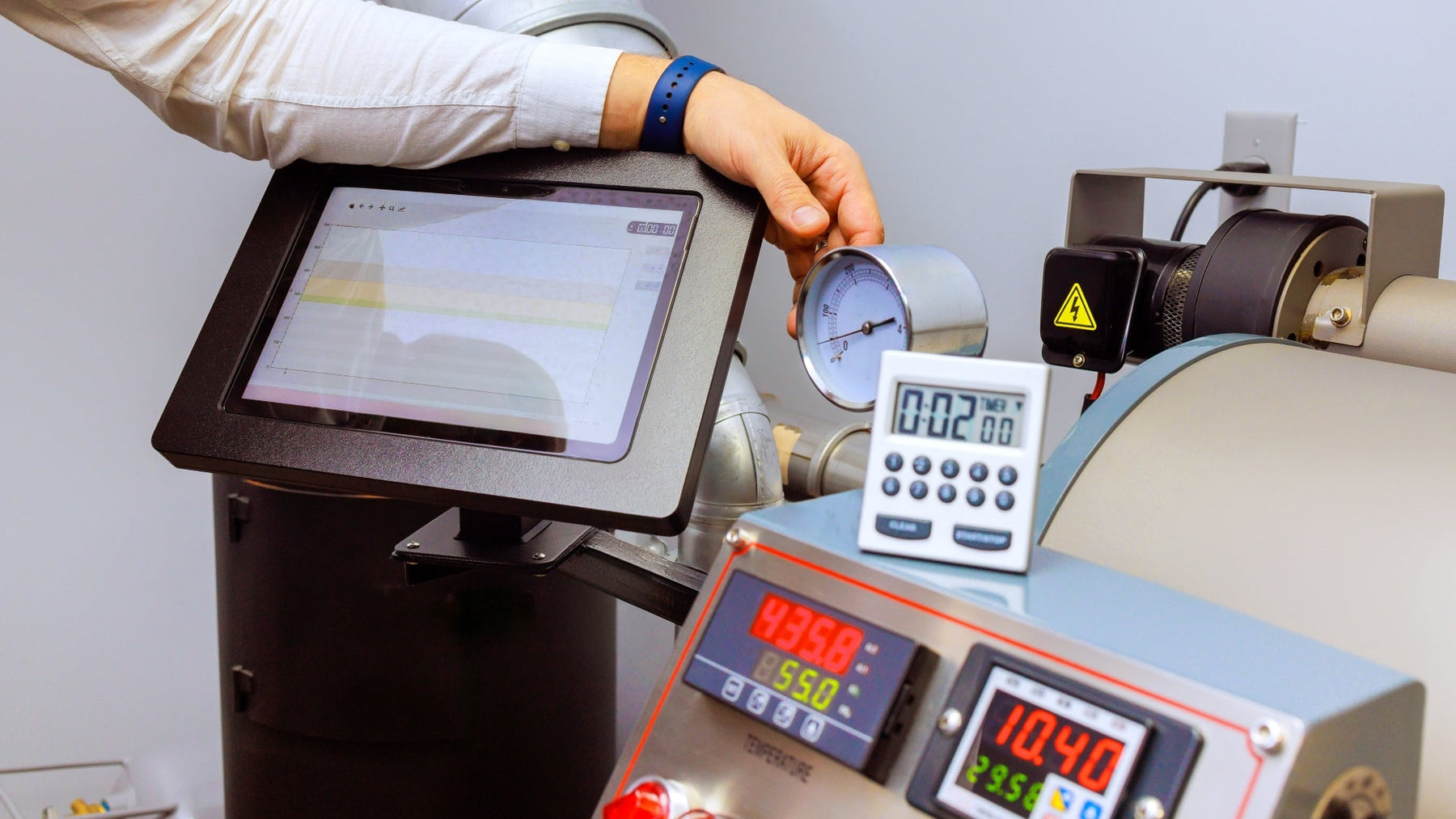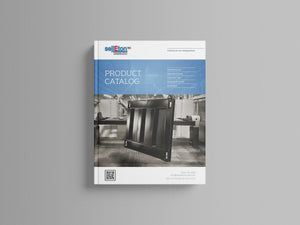
Streamlined Solutions with Weighing System Integration for Your Business
Looking to boost your business efficiency? Weighing system integration can enhance accuracy, streamline operations, and ensure compliance. This article explains how integrating weighing systems with Warehouse Management Systems (WMS) or Enterprise Resource Planning (ERP) systems can bring tangible benefits, from improved inventory management to reduced operational costs. Discover the critical steps and key features of successful integration, as well as real-world applications and future trends.
Key Takeaways
-
Integrating weighing systems with warehouse management and enterprise resource planning systems enhances operational efficiency and ensures regulatory compliance.
-
The benefits of integration include improved inventory accuracy, reduced operational costs, and enhanced decision-making through access to real-time data.
-
Future trends such as IoT and AI are set to revolutionize weighing system technology, further optimizing operations and inventory management.
The Importance of Weighing System Integration
Integrating weighing systems with warehouse management software (WMS) has become essential for businesses aiming for operational efficiency. Linking heavy-duty scales to WMS facilitates order fulfillment and quality control through precise product weight verification, ensuring that every product meets required specifications. This enhances customer satisfaction and maintains brand reputation.
Implementing a weighing system with a WMS ensures regulatory compliance through:
-
Accurate verification of net product weights.
-
Prevention of costly penalties in industries like pharmaceuticals and food, where precise measurements are crucial.
-
Simplification of audits and inspections by providing clear, traceable records of all weighing activities.
Integrating weighing systems with enterprise resource planning (ERP) systems further boosts operational efficiency. Streamlined data flow between systems enables more informed decisions and optimized resource allocation. Seamless communication between weighing systems and WMS ensures completeness and quality in all warehouse operations.
Benefits of Integrating Weighing Systems
Integrating weighing systems with WMS offers numerous benefits, including improved inventory accuracy. Accurate tracking of variable weights reduces errors in order fulfillment and enhances inventory management, leading to fewer discrepancies and more reliable stock levels, crucial for efficiently meeting customer demands.
Another advantage is reduced operational costs, which include:
-
Automating weighing processes to minimize manual handling and reduce data entry time, making tasks easier
-
Lowering labor costs and minimizing human error, which increases customer satisfaction
-
Real-time inventory monitoring to ensure timely restocking and keep products available when needed
Enhanced quality control offers several key benefits:
-
Continuous verification of product weights ensures each product meets required standards, maintaining high quality and preventing overfilling or underfilling.
-
Centralized data storage streamlines report generation and statistical analysis.
-
This centralized data offers valuable insights for business improvements.
Integrating weighing systems also enhances decision-making. Access to real-time data and comprehensive reports allows businesses to optimize operations and quickly respond to market changes. Centralized data storage simplifies managing and analyzing large data volumes, providing a strong foundation for strategic planning and operational efficiency.
How to Integrate Weighing Systems with WMS
Integrating weighing systems with WMS involves:
-
Assessing current systems and processes.
-
Linking industrial weighing scales to WMS through customizations to meet specific operational needs.
-
Updating software as necessary.
-
Configuring network settings.
-
Ensuring component compatibility.
Once systems are linked, combining weighing systems with software solutions significantly improves decision-making through better data analysis. Real-time data from scales can be fed directly into the WMS, enabling immediate updates to inventory levels, order statuses, and other critical metrics. This seamless information flow enhances operational efficiency and allows for more accurate forecasting and planning.
Key Features of Integrated Weighing Systems
Integrated weighing systems offer key features that enhance functionality and efficiency. Continuous weighing, linked with WMS, enhances quality control by reducing reliance on random sampling. This ensures every product is weighed accurately and consistently, maintaining high-quality standards.
Another important feature is the modular design of weighing systems, allowing customization for specific industry requirements. Key aspects include:
-
Tailoring modular designs for industries such as pharmaceuticals, food processing, or logistics
-
Meeting unique operational demands
-
Ensuring flexibility so the system adapts to changing business needs
-
Scaling with operations
Automated data capture is also crucial. Benefits include:
-
Automating data collection and entry streamlines operations and enhances communication between departments.
-
Centralizing weight data in the WMS simplifies report generation and statistical analysis.
-
Providing valuable insights for business improvements.
Real-World Applications of Weighing System Integration
Real-world applications of weighing system integration span multiple industries. In logistics, warehouse pallet scales measure weight in real-time while transporting loads, integrating seamlessly into logistics processes. This ensures shipments are accurately weighed and tracked, preventing discrepancies and delays.
In the pharmaceutical industry, dynamic weighing solutions prevent overfilling and underfilling, safeguarding brand reputation and compliance. By verifying filling levels and content completeness, these systems ensure each product meets required standards, crucial for maintaining regulatory compliance and ensuring customer safety and complete satisfaction.
Another notable application is in order fulfillment, where automatic weight verification ensures accuracy, enhancing customer satisfaction. Verifying orders based on weight minimizes errors and improves customer experience. Companies like Selleton Scales have tailored solutions to individual needs through weighing system integration with Manhattan SCALE, adding to customer service.
Selleton Scales aimed to boost operational efficiency and minimize labor costs by implementing an easy advanced weighing system to save on expenses. These real-world applications demonstrate the versatility and effectiveness of integrated weighing systems in various contexts, showing how businesses can manage this fast technology, including computers, to develop performance and power. Each simple step taken in this production process contributes to overall success, creating a clear line of status progress. To further enhance their operations, the company decided to upgrade their systems.
Choosing the Right Weighing System for Your Warehouse
Selecting the right weighing system for your warehouse involves considering several factors, including your choice of:
-
Capacity
-
Weighing range
-
Size
-
Precision
-
Calibration
-
Durability
-
Strength
For industries needing highly accurate measures, precision scales with a resolution of less than 0.035 ounces are essential to shape details at level min.
Regular maintenance and calibration of weighing systems are crucial to prevent errors that can disrupt operations and reduce accuracy. Keeping equipment in top condition maintains the reliability and precision of weighing processes.
Training employees on the correct use of weighing systems mitigates user errors and improves overall efficiency during integration. Considering these factors and taking a proactive approach to maintenance and training enables businesses to select the right weighing solutions, enhancing warehouse operations and contributing to long-term success.
Overcoming Common Challenges in Weighing System Integration
Integrating weighing systems with WMS can present challenges, but the right strategies can overcome these hurdles:
-
Compatibility with existing software is a common issue, often requiring updates to ensure seamless operation.
-
Staying up-to-date with the latest software versions helps avoid potential integration issues.
-
Ensuring component compatibility is essential to prevent problems during integration.
Data communication issues between weighing scales and management systems can occur, often needing troubleshooting of network connections or software settings. Addressing specific error codes from weighing systems expedites troubleshooting and minimizes downtime. Having a clear message plan for these issues ensures a smoother integration process.
Detecting discrepancies in filling weights early reduces errors and enhances efficiency. Integrating weighing systems with WMS allows businesses to quickly identify and address issues, ensuring all products meet required standards. This proactive problem-solving approach significantly improves operational efficiency and customer satisfaction.
Future Trends in Weighing System Technology
The future of weighing system technology is shaped by emerging trends like IoT and AI. Integrating IoT into weighing systems enables real-time data collection and remote monitoring, enhancing inventory management across sectors. This technology allows businesses to track inventory levels in real-time, ensuring timely restocking and reducing stockout risks.
AI and machine learning are used to optimize weighing operations, enabling systems to adjust measurements based on environmental conditions. These advancements improve accuracy and pave the way for future innovations in data analytics and operational efficiency. Leveraging these technologies enhances decision-making and keeps businesses competitive.
The integration of IoT and AI into weighing systems is just the beginning. As technology evolves, expect further innovation to turn revolutionize inventory management and operational efficiency, providing businesses with the tools ready to succeed in an increasingly competitive cloud market.
Consult the Expert: Selleton Scales
Consulting with experts like Selleton Scales can make all the difference in selecting and integrating the right weighing solutions for your business. Selleton Scales offers specialized consultation services to help businesses choose and integrate tailored weighing systems. Their experts provide valuable insights on the latest weighing technology trends and best practices for maintaining accuracy and efficiency.
Selleton Scales emphasizes customizing solutions to meet unique warehouse workflows and product handling extensions demands. By understanding specific requirements and challenges, their experts recommend the most suitable weighing solutions to enhance operations and contribute to long-term success.
Whether you need guidance on selecting equipment, assistance with system integration, or ongoing support, Selleton Scales is your trusted partner for achieving operational excellence. Contact them to learn more about how their expertise can benefit your business.
Summary
In conclusion, integrating weighing systems with warehouse management software offers numerous benefits, including improved inventory accuracy, reduced operational costs, and enhanced quality control. By understanding the importance of this integration, the benefits it provides, and the steps involved, businesses can make informed decisions that will enhance their operations. With the support of experts like Selleton Scales, you can navigate the challenges and leverage the latest technology trends to achieve operational excellence. Embrace the future of weighing system technology and unlock new levels of efficiency and accuracy for your business.
Frequently Asked Questions
Why is integrating weighing systems with WMS important for my business?
Integrating weighing systems with WMS is crucial for your business as it ensures regulatory compliance while enhancing operational efficiency and improving inventory accuracy through precise product weight verification. This integration ultimately supports better decision-making and streamlined processes.
What are the key benefits of integrating weighing systems with WMS?
Integrating weighing systems with Warehouse Management Systems (WMS) significantly improves inventory accuracy and reduces operational costs. Additionally, it enhances quality control, allows for real-time monitoring, and facilitates better decision-making through centralized data storage.
How can I integrate weighing systems with my existing WMS?
To effectively integrate weighing systems with your existing WMS, assess your current infrastructure, customize the software for compatibility, and ensure real-time data transfer from weighing scales to the WMS to improve decision-making and operational efficiency.
What features should I look for in an integrated weighing system?
Look for features such as continuous weighing, modular designs, automated data capture, and centralized data storage, as these enhance operational efficiency and communication in your warehouse. Prioritizing these elements will ensure an effective integrated weighing system.
How can Selleton Scales help with weighing system integration?
Selleton Scales can significantly assist with weighing system integration by providing specialized consultation services that guide businesses in selecting and implementing tailored solutions. Their expertise ensures that clients benefit from the latest technology trends and best practices, enhancing accuracy and efficiency in their operations.

